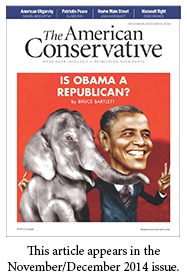Don Colacho’s Epitaphs

Nicolás Gómez Dávila should be one of the most divisive writers in the contemporary world of letters and political thought. He should, on the one hand, have a legion of readers who hang on his every word like freshly hooked fish. On the other hand, he should have an equal, perhaps slightly larger force of readers—taking into account those who don’t actually read what they’re detracting—who see his writing as little more than a verbal ipecac. But two decades after his death, no such divisions have been wrought. Gómez Dávila’s literary oblivion is arguably the least attractive, if most poetic, kind: earned not by conspiracy or changing fashions but by his own hand.
“Democracy has terror for its means and totalitarianism for its end,” Gómez Dávila once wrote. In that single stroke an argument is initiated and ended. It is just one of thousands of sentences Gómez Dávila composed in his nearly 81-year life, but which very few have read. They covered every deep subject imaginable in the same terse, confident, clever, and intransigent manner, at only slightly varying lengths. These aphorisms, called escolios (“scholia” or “glosses”) by their author, stand on their own, ever at attention like a verbal infantry with bayonets armed, ready to return fire rather than to facilitate civil dialogue. In his lifetime Gómez Dávila would publish these passages only reluctantly, often at the insistence of others, and usually on his own publicity-averse terms.
On the surface, these aphorisms seem like throwaways. Yet Gómez Dávila’s mind was not wired for frivolity. In spite of their brevity, each escolio has a sculpted composition, fashioned to conform to an overriding vision that is as rigid in its consistency as it was free from ideological conventions.
Matching the brevity of this work is the scarcity of biographical information about its author, at least in English. We know that Gómez Dávila was born in 1913 in Cajicá, Colombia, 25 miles outside Bogotá. His father was a wealthy industrialist who moved his family to France while Gómez Dávila was still young. He was educated by Benedictines before being bedridden for two years by pneumonia. He returned to Colombia in his early 20s and rarely left again. He married and had three children. Despite his stunted formal education, he was able to speak and/or read in nearly all the major European languages, and he would later take part in founding Universidad de los Andes.
He did not need to work; whatever obligations he had in managing his father’s carpet-manufacturing business were minimal. Though considered a recluse today, Gómez Dávila had an active social life among Colombia’s elite, who nicknamed him Don Colacho. He was an avid horseman, splitting his time between his library and a jockey club until an injury largely restricted him to the former. Gómez Dávila, like Schopenhauer, was free from the obligations of getting on in life and so resolved to occupy himself with thinking about it ceaselessly. For all intents and purposes his library, filled with nearly 30,000 books, was his “office.”
His actual “job” is difficult to pin down. Few would call him a philosopher or scholar, Gómez Dávila having the inclinations and abilities of both while lacking the credentials. “Thinker” seems too precious for his severe sensibilities and “curmudgeon” too coarse. In ambiguous cases like these, it’s just easier to follow the preferences of the jobholder: “The reactionary today is merely a traveler who suffers shipwreck with dignity.” That is what Gómez Dávila was.
“The reactionary does not become a conservative except in ages which maintain something worthy of being conserved.” Reaction is a very antipolitical line of political thought, formed less by systematic programs, rationales, or coalitions than by whatever it is its most vocal adherents deem correct. “In the immense sphere of living things,” wrote 19th-century Savoyard thinker Joseph de Maistre, “the obvious rule is violence, a kind of inevitable frenzy which arms all things in mutua funera.”
Conservatism’s appeal has always rested in its professed unwillingness to compromise in pursuit of its causes. A reactionary distinguishes himself or herself from the movement conservative by being committed and uncompromising to a degree that discomforts the latter. The conservative embraces democracy to the extent that the conservative can direct it in reaching his or her goals. The reactionary merely resigns him or herself to its existence. “I am an aristocrat,” said early 19th-century Virginia congressman John Randolph of Roanoke, “I love liberty, I hate equality.”
If conservatives are characterized by nostalgia, reactionaries are characterized by decadence. Conservatives build networks and speak in sound bites; reactionaries build mausoleums and speak in epitaphs. Reactionaries are aesthetic rather than practical thinkers. They play alongside, if not across, the border of tragedy and fatalism. Civil debate is meaningless to the side that has already lost.
“If the reactionary concedes the fruitlessness of his principles and the uselessness of his censures,” Gómez Dávila wrote in his essay “The Authentic Reactionary,” “it is not because the spectacle of human confusion suffices for him. The reactionary does not refrain from taking action because the risk frightens him, but rather because he judges that the forces of society are at the moment rushing headlong toward a goal that he disdains.”
Gómez Dávila’s reactionary gaze was a vast one applicable to any subject previously worthy of intellectual dissection: from politics to economics to the arts to manners, and certainly religion. Gómez Dávila found corruption not only in democracy but in capitalism (“The Gospels and the Communist Manifesto are on the wane; the world’s future lies in the power of Coca-Cola and pornography”); in the rise of industry and technology (“God invented tools, the devil machines”); in individual liberty (“Liberalism proclaims the right of the individual to degrade oneself, provided one’s degradation does not impede the degradation of one’s neighbor”); and in blind patriotism (“That patriotism which is not a carnal adhesion to specific landscapes, is rhetoric designed by semi-educated men to spur the illiterate on towards the slaughterhouse”). This is to name but a few cultural felonies that protrude from our mundane striving for betterment. As Gómez assesses: “The cultural standard of an intelligent people sinks as its standard of living rises.”
Against the “vulgarity” of mechanization, of popular sovereignty, and of bourgeois striving stand the “virtues” of aesthetic purity, of hierarchy, and of aristocratic chivalry. Notions of God, tradition, and discipline are nothing new to Americans—many hold them dear—yet they spoil into abstraction when not fueling our prized mobility. “With the disappearance of the upper class, there is nowhere to take refuge from the smugness of the middle class and the rudeness of the lower class.” 
Yet virtues exist as ends in themselves, as prerequisites for character rather than as shortcuts to security. The lesson’s simplicity could be insulting when drained either of Gómez Dávila’s polished austerity—“Discipline is not so much a social necessity as an aesthetic obligation”—or his idiosyncratically inclusive grandness: “The true aristocrat is the man who has an interior life. Whatever his origin, his rank, or his fortune.”
Though severe and fatalistic, Gómez Dávila’s writing never reached Maistre’s blank misanthropy. And for all of its fulminating against progress, Gómez Dávila’s aristocratic ideal was every bit as utopian, countercultural, and impractical as that of any tenured radical or commune dweller. In his later life, Gómez Dávila would be offered political appointments on more than one occasion, first in 1958 as an adviser to President Alberto Lleras Camargo and again in 1974 as ambassador to the United Kingdom. To his credit, he turned down both.
His refusal to act in workaday politics carried over into his reluctance to publish any of his writing. With coaxing from family and friends he published private, limited editions of his aphorisms in 1954, simply titled Notas, and a collection of longer pieces, Textos, in 1959. Only in 1977 did he publish the more extravagantly christened collection Escolios a un Texto Implícito (Scholia on the Margin of an Implicit Text), whose title set the pattern for subsequent publications in 1986 and 1992.The small print runs and dry packaging ensured that very few people would take interest in discovering the salacious contents contained therein.
Near the end of his days, however, Gómez Dávila started to attract attention outside of his immediate circle, even outside his own country—predominantly in Germany, where conservative writers like Botho Strauss, Martin Mosebach, and their elder statesman Ernst Jünger took interest in his works. This soon gave way to translations and mass publication in Germany, France, and Italy. His presence in his native Colombia remains faint, though his books have been brought back into print with the support of his daughter, and Gabriel García Márquez is rumored to have said that he would gladly think like Gómez Dávila, were he not already a communist.
Still fainter than his presence in Latin America is his presence in North America. “The Authentic Reactionary” appeared in Modern Age in 2010, but no official English translation of Gómez Dávila’s aphorisms has ever been published. Yet they exist in English nonetheless: the work of this man who never owned a television has found its way onto the Internet, with private translations passed around like a virtual samizdat. The most comprehensive collection exists thanks to someone going by the username “Stephen,” who operates a blog called Don Colacho’s Aphorisms, which has painstakingly organized and posted English translations of nearly 3,000 aphorisms since 2010, with an index by subject matter and links to other sources and translations.
A search on Twitter finds six accounts with Gómez Dávila’s name and image attached to them. Of those, three are in English, and one—handled @DColacho and co-managed by First Things deputy editor Matthew Schmitz—updated regularly until March of this year, retains over 700 followers. From these sources, Gómez Dávila’s words are spread ever further and faster, freshly uncovered by new followers, many of them young: an ideological mix of conservative, Catholic, monarchist, anarchist, traditionalist, aesthete, and every conceivable combination thereof.
With so fervent, independent, and seemingly spontaneous a following, is a formal book or “legitimate” translation even called for? I think it is a possibility worth exploring at least. Though Gómez Dávila lacks the playful contradictions that teem in the aphorisms of Friedrich Nietzsche and the corroding bile of Ambrose Bierce’s Devil’s Dictionary, he is no less the individual mind than they are. His style trades comfortably in cold elegance and brutal condemnation, apart or in lethal combination.
Gómez Dávila was a scourge of his age. He was, in the end, more of a literary and philosophical diagnostician than a prophet. There isn’t much in the way of soothsaying affirmation in Don Colacho—in fact there is none—but there is the balm of honest assessment, which stings and cools with any application, but never numbs.
Chris R. Morgan lives in New Jersey and was editor of a
cultural ‘zine called Biopsy.
Comments